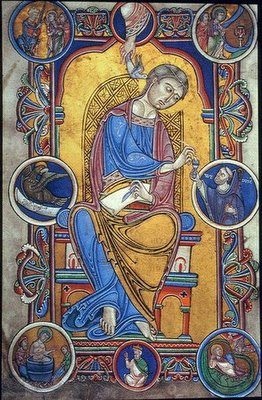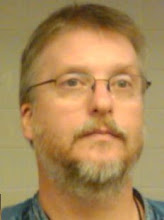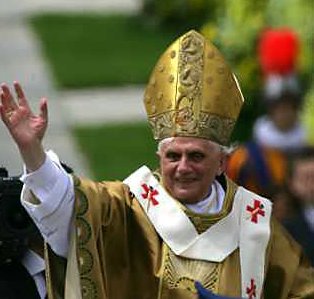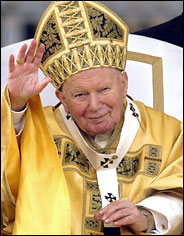On Silvesternacht

From the Golden Legend
In this time it happed that there was at Rome a dragon in a pit, which every day slew with his breath more than three hundred men. Then came the bishops of the idols unto the emperor and said unto him: O thou most holy emperor, sith the time that thou hast received christian faith the dragon which is in yonder fosse or pit slayeth every day with his breath more than three hundred men.
Then sent the emperor for S. Silvester and asked counsel of him of this matter. S. Silvester answered that by the might of God he promised to make him cease of his hurt and blessure of this people. Then S Silvester put himself to prayer, and S. Peter appeared to him and said: Go surely to the dragon and the two priests that be with thee take in thy company, and when thou shalt come to him thou shalt say to him in this manner: Our Lord Jesu Christ which was born of the Virgin Mary, crucified, buried and arose, and now sitteth on the right side of the Father, this is he that shall come to deem and judge the living and the dead, I commend thee Sathanas that thou abide him in this place till he come. Then thou shalt bind his mouth with a thread, and seal it with thy seal , wherein is the imprint of the cross. Then thou and the two priests shall come to me whole and safe, and such bread as I shall make ready for you ye shall eat.
Thus as S. Peter had said, S. Silvester did. And when he came to the pit, he descended down one hundred and fifty steps, bearing with him two lanterns, and found the dragon, and said the words that S. Peter had said to him, and bound his mouth with the thread, and sealed it, and after returned, and as he came upward again he met with two enchanters which followed him for to see if he descended, which were almost dead of the stench of the dragon, whom he brought with him whole and sound, which anon were baptized, with a great multitude of people with them.
Thus was the city of Rome delivered from double death, that was from the culture and worshipping of false idols, and from the venom of the dragon. At the last when S. Silvester approached towards his death, he called to him the clergy and admonished them to have charity, and that they should diligently govern their churches, and keep their flock from the wolves. And after the year of the incarnation of our Lord three hundred and twenty, he departed out of this world and slept in our Lord, etc.
From the Ecclesiastical History by Eusebius of Caesarea, bishop
Lib 10, 1-3
Thanks for all things be given unto God the Omnipotent Ruler and King of the universe, and the greatest thanks to Jesus Christ the Saviour and Redeemer of our souls, through whom we pray that peace may be always preserved for us firm and undisturbed by external troubles and by troubles of the mind.
Since in accordance with thy wishes, my most holy Paulinus, we have added the tenth book of the Church History to those which have preceded, we will inscribe it to thee, proclaiming thee as the seal of the whole work; and we will fitly add in a perfect number the perfect panegyric upon the restoration of the churches, obeying the Divine Spirit which exhorts us in the following words:Sing unto the Lord a new song, for he hath done marvelous things. His right hand and his holy arm hath saved him. The Lord hath made known his salvation, his righteousness hath he revealed in the presence of the nations.And in accordance with the utterance which commands us to sing the new song, let us proceed to show that, after those terrible and gloomy spectacles which we have described, we are now permitted to see and celebrate such things as many truly righteous men and martyrs of God before us desired to see upon earth and did not see, and to hear and did not hear.
But they, hastening on, obtained far better things, being carried to heaven and the paradise of divine pleasure. But, acknowledging that even these things are greater than we deserve, we have been astonished at the grace manifested by the author of the great gifts, and rightly do we admire him, worshiping him with the whole power of our souls, and testifying to the truth of those recorded utterances, in which it is said, "Come and see the works of the Lord, the wonders which he hath done upon the earth; he removeth wars to the ends of the world, he shall break the bow and snap the spear in sunder, and shall burn the shields with fire."
Rejoicing in these things which have been clearly fulfilled in our day, let us proceed with our account.
The whole race of God's enemies was destroyed in the manner indicated, and was thus suddenly swept from the sight of men. So that again a divine utterance had its fulfillment: "I have seen the impious highly exalted and raising himself like the cedars of Lebanon and I have passed by, and behold, he was not and I have sought his place, and it could not be found."
And finally a bright and splendid day, overshadowed by no cloud, illuminated with beams of heavenly light the churches of Christ throughout the entire world. And not even those without our communion were prevented from sharing in the same blessings, or at least from coming under their influence and enjoying a part of the benefits bestowed upon us by God.
All men, then, were freed from the oppression of the tyrants, and being released from the former ills, one in one way and another in another acknowledged the defender of the pious to be the only true God. And we especially who placed our hopes in the Christ of God had unspeakable gladness, and a certain inspired joy bloomed for all of us, when we saw every place which shortly before had been desolated by the impieties of the tyrants reviving as if from a long and death-fraught pestilence, and temples again rising from their foundations to an immense height, and receiving a splendor far greater than that of the old ones which had been destroyed.
But the supreme rulers also confirmed to us still more extensively the munificence of God by repeated ordinances in behalf of the Christians; and personal letters of the emperor were sent to the bishops, with honors and gifts of money. It may not be unfitting to insert these documents, translated from the Roman into the Greek tongue, at the proper place in this book, as in a sacred tablet, that they may remain as a memorial to all who shall come after us.
After this was seen the sight which had been desired and prayed for by us all; feasts of dedication in the cities and consecrations of the newly built houses of prayer took place, bishops assembled, foreigners came together from abroad, mutual love was exhibited between people and people, the members of Christ's body were united in complete harmony.
Then was fulfilled the prophetic utterance which mystically foretold what was to take place: "Bone to bone and joint to joint," and whatever was truly announced in enigmatic expressions in the inspired passage.
And there was one energy of the Divine Spirit pervading all the members, and one soul in all, and the same eagerness of faith, and one hymn from all in praise of the Deity. Yea, and perfect services were conducted by the prelates, the sacred rites being solemnized, and the majestic institutions of the Church observed, here with the singing of psalms and with the reading of the words committed to us by God, and there with the performance of divine and mystic services; and the mysterious symbols of the Saviour's passion were dispensed.
At the same time people of every age, both male and female, with all the power of the mind gave honor unto God, the author of their benefits, in prayers and thanksgiving, with a joyful mind and soul. And every one of the bishops present, each to the best of his ability, delivered panegyric orations, adding luster to the assembly.











